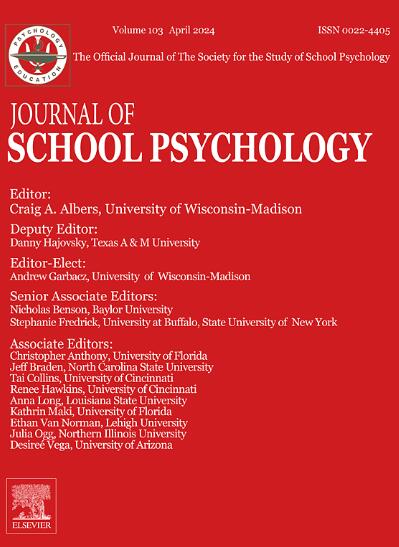Cultural adaptation of youth mental health first aid training for Asian American parents
IF 4.1
1区 心理学
Q1 PSYCHOLOGY, SOCIAL
引用次数: 0
Abstract
Although often portrayed as “model minorities,” many Asian American adolescents struggle with mental health problems. Asian American youth are also less likely to receive school-based mental health services (SBMHS) compared with their non-Asian peers. Culturally adapting the Youth Mental Health Fist Aid (YMHFA) training program can be an effective way to engage Asian American parents to utilize SBMHS. Although many school districts have offered YMHFA trainings to staff and parents, no controlled studies have evaluated the efficacy of YMHFA in the United States. We culturally adapted YMHFA for Asian American parents through collaboration with schools and community organizations, and evaluated its efficacy using a blocked random assignment study design. We examined if (a) YMHFA impacted parents' mental health literacy (MHL), help-seeking intentions, stigma, attitudes towards professional help, confidence in MHFA skills, engagement in first-aid behaviors, and youth mental health (both parent and youth report); and (b) whether the improvement was maintained four months after the training. Parents (n = 99, Mage = 46.24; SDage = 6.80, 89 % mothers) were randomly assigned to treatment and waitlist control groups. They completed measures before the intervention, one month after the intervention, and four months after the intervention. Parents in the experimental group showed decreased stigma, and improvements in MHL, attitudes towards help seeking, confidence in using first aid behavior, and actual engagement in first aid behavior after attending the training as compared to parents in the waitlist control group. Participants in waitlist control group also showed improvements in all above-mentioned areas after receiving the training. All treatment gains were maintained at 4-month follow-up. Findings contributed to the limited literature on how to culturally adapt YMHFA for Asian American parents at school, and provided evidence for the efficacy of YMHFA among Asian American parents.
亚裔美国父母青少年心理健康急救培训的文化适应
虽然经常被描绘成“模范少数族裔”,但许多亚裔美国青少年都在与心理健康问题作斗争。与非亚裔同龄人相比,亚裔美国青少年接受学校心理健康服务(SBMHS)的可能性也更低。从文化上适应青少年心理健康急救(YMHFA)培训计划可以有效地吸引亚裔美国父母使用SBMHS。虽然许多学区已经为员工和家长提供了青年教师培训,但在美国,还没有对照研究评估过青年教师培训的效果。通过与学校和社区组织合作,我们对亚裔美国父母进行了文化调整,并使用阻塞随机分配研究设计评估了其有效性。我们检验了(a) MHFA是否影响父母的心理健康素养(MHL)、求助意向、污名、对专业帮助的态度、对MHFA技能的信心、急救行为的参与和青少年的心理健康(父母和青少年报告);及(二)培训后四个月,改善情况是否持续。父母(n = 99, Mage = 46.24;SDage = 6.80, 89%的母亲)被随机分配到治疗组和等候组。他们在干预前、干预后一个月和干预后四个月分别完成了测量。与等候名单对照组的家长相比,实验组的家长在参加培训后,在MHL、寻求帮助的态度、使用急救行为的信心和实际参与急救行为方面表现出了减少的耻辱感,以及改善。候补名单对照组的参与者在接受培训后,上述各方面均有所改善。所有治疗效果在随访4个月时保持不变。研究结果弥补了关于如何在学校为亚裔美国父母适应YMHFA的有限文献,并为YMHFA在亚裔美国父母中的有效性提供了证据。
本文章由计算机程序翻译,如有差异,请以英文原文为准。
求助全文
约1分钟内获得全文
求助全文
来源期刊

Journal of School Psychology
PSYCHOLOGY, EDUCATIONAL-
CiteScore
6.70
自引率
8.00%
发文量
71
期刊介绍:
The Journal of School Psychology publishes original empirical articles and critical reviews of the literature on research and practices relevant to psychological and behavioral processes in school settings. JSP presents research on intervention mechanisms and approaches; schooling effects on the development of social, cognitive, mental-health, and achievement-related outcomes; assessment; and consultation. Submissions from a variety of disciplines are encouraged. All manuscripts are read by the Editor and one or more editorial consultants with the intent of providing appropriate and constructive written reviews.
 求助内容:
求助内容: 应助结果提醒方式:
应助结果提醒方式:


